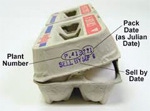January 30, 2014

By Richard Erlich
The U.K. government is considering plans to cut food waste by simplifying and
clarifying the use of "best before" and "use by" dates on food packaging. The
plan makes a lot of sense. Law professors tell their students that the principle
of lawyer-client privilege exists to protect not clients but lawyers; we should
all recognise the same principle in both "best before" (BB) and "use by" (UB)
labelling on foodstuffs. They don't serve to protect consumers from harm. They
protect manufacturers and retailers from lawsuits.
Consumers rely on the labels slavishly, and too many of us chuck out any number
of products whose date has passed. That attitude contributes to the mountainous
volume of edible food waste in the UK, now standing at 5.3m tonnes according a
recent study jointly issued by WRAP and WWF. The Department for Environment Food
and Rural Affairs (Defra) wants to cut that waste by simplifying the rules, and
specifically by emphasising UB rather than BB.
The two terms mean completely different things. "Best before" indicates the date
before which a product provides the most satisfying experience for the consumer.
After BB-day, the apples will start to lose a little of their crunch and the
mashed potatoes in the shepherds pie may dry out a little and start to go
crusty. Both apple and pie are safe to eat, but they just won't be at their
best.
BB dates are important for the food industry because they want consumers to
think they sell nice food. For consumers, they are a complete waste of time.
They do nothing to promote public health. Defra has got it exactly right in
wanting to bin them (figuratively speaking).
UBs are different. This is the date after which, in theory, the product is not
safe to eat. UB dates are most important in anything that contains animal
products and especially in anything fresh, rather than preserved. A day or two
past the UB date of smoked mackerel fillets - no problemo. Fresh
mackerel - tread a little more carefully. The term of a UB date will be days
away for fresh products, months or even years away if the product is preserved.
Now, officially I have to say: never, ever eat anything that has passed its UB
date. Unofficially, we can probably agree that things aren't so simple - or so
perilous. The date may say one thing, but the evidence of our senses, and of our
plain old common sense, may say something different.
For one thing, there are major differences between one type of food and another.
I've got a jar of anchovies in my fridge door whose BB passed late last year. As
long as the fish remain covered by oil, I will leave it there. I've got the
nub-end of a heavenly salami brought back from Rome last autumn and released
from its vacuum pack a month ago. It's a little drier than it was when opened,
but still delicious and still completely safe. If it dries out too much, I'll
just chew harder. Throw it away? Never.
Needless to say, I would not keep fresh fish for such a long time. Or fresh
sausages. But this is just the common sense you build up from shopping, cooking
and eating over the years. Somehow I manage to buy all my fresh meat and fish
from a butcher and a fishmonger, neither of whom provides BB or UB dates,
without getting food poisoning. I think correct handling - storage, cleanliness,
cooking - is far more important for food safety than the date stamped on a
packet of cheddar.
Parenthetically: the anti-waste campaign should add another strategy, telling
consumers to buy less stuff in the first place. I'm not sure if retailers would
get behind that initiative, but it is the root cause of the problem. We throw
away lots of food because we buy stuff we don't need.
Every experienced home cook has his or her own favorite tips for using things
up and thereby avoiding food waste. My numero uno: plop that block of
end-of-the-line, rock-hard Parmesan, including the rind, in a pot of minestrone.
It turns vegetable soup into the food of the gods. And I'll bet you have your
favourite waste avoidance stratagems, too. Go on, spill the beans and let's help
each other keep our food off the top of the big waste mountain.
(c) 2011 Guardian Newspapers Limited.
About the Author(s)
You May Also Like


